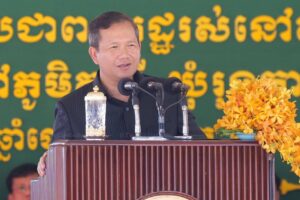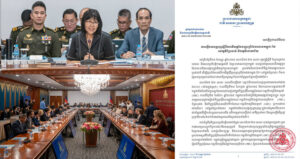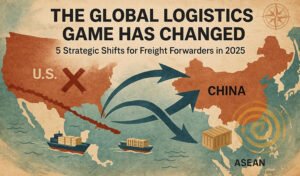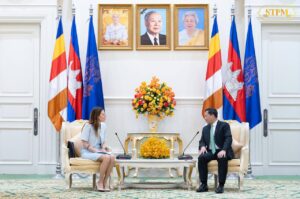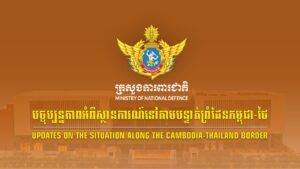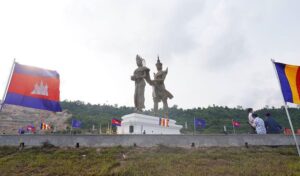(Video) Selected Comments of Samdech Thipadei Hun Manet, the meeting with civil servants, staff, and Workers of the Preah Sihanouk Autonomous Port on the occasion of the celebration of the 139th anniversary of International Workers’ Day – May 1 [Unofficial Translations]
[1]
(1) Sihanoukville is one of four coastal provinces to promote development potential
This is the fourth time in nearly two years that I have come to the port (of Sihanoukville Autonomous City) […] I have come to the Sihanoukville province about eight times thus far […] and my presence at times announced the launch of a policy to promote investment in Sihanoukville, inaugurated achievements in both the defense and investment sectors, inaugurated schools and met with (workers) in the special economic zone […] (I came to organize and advise on) many sectors, because Sihanoukville is one of the four coastal provinces where the government aims to promote development potential […] not only tourism, but also industry, transportation and exports […] We are implementing a pilot step in 2025, using Sihanoukville as a base […] to attract more investment […] In a few days, I will inaugurate a special economic zone that will increase the number of factories to 200 […] When there is economic strength, there is also a large number of people to come […]
[3]
(2) A CEO to ensure ownership and efficiency of strategic enterprises to compete
The formula for the leadership/management of the Sihanoukville Autonomous Port (SAP) is one that has been successful for public institutions or state enterprise […] If the (state) structure and leadership were effective here, and it could compete with the private sector (then we would encourage them to continue). If it does not work or it cannot move forward, however, we can consider opening the gate to bring in a CEO (from the private sector). To allow here means to exercise flexibility to ensure that there are capable, experienced, and impartial figures leading in the private sector to help with the leadership/management […] The selection procedure is to be examined by the board of directors who conduct evaluation using the KPI (Key Performance Indicator) evaluation system […] that will create flexibility to ensure ownership and efficiency to extract benefits for enterprises, whether state or private, especially some strategic enterprises, to be able to compete […] Not only developing infrastructure but also continuing to manage with innovation and efficiency […]
(3) Developing SAP a port serving regional transportation and logistics center
We want to make this port not only a port for Cambodia and the world, but also a port serving regional transportation and logistics center, which has been an ongoing task for a long time […] At the end of 2023, during my visit to Japan to attend the ASEAN-Japan Summit, I met with His Excellency Fumio Kishida, then Prime Minister of Japan. We requested that Japan help develop a master plan and transform this port into a regional deep-water port and a regional logistics center […] We want to play a more active role in the region and the world […] In the first phase, we will make the water depth 14.5 meters. At this depth, after completion, ships of 60,000 tons (can enter the port) […] The second phase is planned to be completed in 2029, increasing the depth to 16.5 meters, and the third phase is planned to be completed in 2030, with a depth of 17.5 meters, allowing ships from all over the world to enter the port of Sihanoukville without having to transfer goods anywhere […]
(4) RGC and concerned institutions to review and adjust various procedures, and apply technologies to reduce costs and time
With a strategically favorable geographical location, we can increase the volume of regional transportation, reduce costs (and time of transportation) to and from Cambodia. Combined with mechanisms and measures that we have put in place, we will continue to work on establishing transshipment ability and transforming the Sihanoukville Autonomous Port into a system that ensure internal mobility of transportation […] In the future, we will further consider not only infrastructure, but also internal flow systems […]
In this flow of work, there are two factors to take into consideration – firstly, improving and modernizing (the Sihanoukville Autonomous Port service) and secondly, (establishing and ensuring) a safety system […] We must continue to figure out how to increase (capacity and efficiency) […] since neighboring countries are not standing still. They are (also preparing to) cut more procedures […] The Royal Government and concerned institutions will work together to review and adjust various procedures, along with the use of technologies to reduce (costs and time) […]
(5) More ships enter the port in the future, there will be more cargos and regional transshipment is on the rise
Last year, HE Lou Kimchun, Delegate of the Royal Government of Cambodia in Charge as Chairman & CEO of Sihanoukville Autonomous Port, took the step six development plan to my knowledge and approval […] which (prepares) where to do what, and has already drawn up a plan. The Minister of Public Works and Transports, HE Peng Purna, also knows about this. We have a long-term vision. I urge (the Deputy Prime Minister and Minister of Land Management, Urban Planning and Construction) HE Say Samal and (the Governor of Preah Sihanouk Province) HE Mang Sinet, to reserve the land next to this port for the port’s future development. When we expand, this size is not enough. Dealing with just two million containers, we are in need of a lot of storage space. This container port is one part, but in the future, we will have a Bonded Warehouse Transshipment system […] When more ships enter the port, there will be more cargos traffics. Regional transshipment is more and more on demand. Cooperation with Japan on this issue has been limited. Let us look for a way to go further […]
(6) Cooperation with Japan is a major goal, a long-term strategy of the current RGC
Certainly, global trade will continue. This three-step investment (of the SAP development used the capital) of over 750 million USD in loans from Japan. Cooperation with Japan, in the new government mandate, is a major goal, a long-term strategy. With Japan (we have) four pillars and one of them is the expansion of the Sihanoukville Port to reach the level of a bilateral strategic (partnership) between Cambodia and Japan. I thank the Japanese who has been helping us with this work. We are together. I can assure our Japanese friend that Cambodia will uphold the importance to the partnership with Japan to develop this project […] (Cambodia-Japan cooperation is) a long-term strategy […] We have been doing it since before we reached the one million (TEUs containers). We have been doing it together until we are reaching now two or three million TEUs. We very much appreciate and are grateful that Japan continues to be the partner here […]
(7) Consider and select locations for future oil refinery not at SAP
Some asked why (we chose to develop) the Sihanoukville Autonomous Port when Cambodia has many other ports in the country. It is not that we do not pay attention to developing the logistics system in other places, but for all the ports that exist, one of them has to be the main hub, especially in terms of goods and people. We are studying other ports related to the future of industries such as oil extraction, petrol chemical production, etc., which cannot be located in the Sihanoukville Autonomous Port […] I have asked (the Minister of Mines and Energy) His Excellency Keo Rattanak, together with the Ministry of Public Works and Transport, to consider and select several places so that in the future we can install an oil refinery, considering both environmental risks and strategy, not close to Sihanoukville province […] and prepare the physical infrastructure and ecological system to serve oil refining at other ports so that those places can also grow […]
(8) The economic cycle goes up and down and the world economy cannot be closed to trade
Why do we invest and continue to invest (in port development) while the world is on the verge of a trade war […] If the major economic powers fall, transportation will decrease, so why spending 750 million on expansion? The economic cycle, firstly, goes up and down. It is normal. In the long run, it will always increase. Secondly, the world economy cannot be cut off or closed to trade […] No country can, grow, and produce everything on its own and survive on its own […] If there is no cutting off of world relations, trade relations will expand because the number of people increases, the size of demand increases. Then the quantity and price of goods will continue to be exchanging […] Even in 100 years, water will not be able to melt from one location, send it via the Internet, and then reassemble it into water again in another location. Therefore, the transportation of real things must use the same traditional means of transportation, including water, land, and air, and only water transportation is the cheapest […] In the world, now nearly 80% of goods are transported by water because it is cheap and efficient. This method will continue […]
(9) Maintaining peace is the core factor that ensures we do not go backwards
This is a loan that the government borrowed from Japan to invest (in the port development). We are taking this 750 million USD loan to invest in this project to boost the economy. (We calculate clearly that) this investment will bring billions in tens of years to Cambodia since it is a responsible and wise investment […] We have taken the 750 million USD loan to create billions every year to create an economy, jobs and help Cambodia become more prominent on the international stage […] Some people like to say that since 2050 we will become a rich country, so there is no need to work hard […]
That will not be the case. Being rich, countries must also work hard so as not to fall into poverty again. Countries in Africa and the Middle East were once rich 10, 20, or 30 years ago, but because they could not maintain peace, they became poor. People who used to prosper and have job opportunities, now they are dying on the battlefield, they used to have technology for export, but now they are using technology to serve in the war at home. So, in order to move forward, we must unite to maintain peace as this is the core factor that ensures we do not go backwards […]
(10) A special task force to promote and facilitate investment decisions in Sihanoukville and the provinces along the coast
Global trade will increase, and the transportation system will also be expanding. Sihanoukville itself is not only a province and a port that is strategic and long-term, in line with the government’s priority plan […] but also a pole that the government has paid attention to and has put forward in its master plan for coastal development, as the base province, to be implemented in 2025. We are preparing some areas here to push for a free trade zone in the future, to enhance the competitiveness of Sihanoukville and our coastal areas. We are not just having the master plan on paper. We are preparing what need to be done too […] The Electricite du Cambodge is preparing to build a medium-voltage undersea power line from Koh Rong to Koh Rong Samloem, a project with a budget of three million USD and scheduled for completion by the end of 2025 […] The government has set up a special task force in Sihanoukville to promote investment, to facilitate some investment decisions here […] We have sent here not only infrastructure, but also a labor system, an easier investment decision-making system, to encourage investment in Sihanoukville and to the provinces along the coast more quickly […]
(11) Preah Sihanouk Province is the sixth province to have completed the measurement and registration of land parcels
Every time I go abroad, I meet with investors and leaders of other countries, and they do the same. We have policies that encourage investors, and they also have policies that encourage them. So, the CDC (Council for the Development of Cambodia) has laid out policies of encouragement and by meeting with the private sector try to find ways to make our policies more competitive […] We must continue to innovate and modernize both infrastructure and work systems, as well as modernize our capabilities and human resources so that we can ensure our competitiveness and ownership in the world […] Preah Sihanouk Province is the sixth province to have completed the measurement and registration of land parcels […] Our country’s land area is more than 181,035 square kilometers, measured by GPS computer calculation […] Some of the borders with Thailand are still not agreed upon. With Laos, we still have 14 percent to negotiate. With Vietnam, 16 percent remains. After the measurement is completed, we will calculate the whole land area […]
[4]
(12) To promote Sihanoukville as an industrial zone and a free trade zone in the future
I urge continued cooperation with the Japanese side to help promote the master plan to develop Sihanoukville as a regional logistics and transportation center more quickly so that we can move forward with the consideration of action plans and adjustments to go hand in hand to promote Sihanoukville as an industrial zone and a free trade zone in the future […] As for how far has the trade issue with the US progressed and what has the Royal Government done? […] Up to this point, no country has yet negotiated successfully with the US. Japan is a superpower and a close ally of the US since the end of World War II, led by the Minister of Trade to negotiate in Washington, but has not yet reached an agreement […] Negotiation with one is a negotiation with all. What does that mean? Japan negotiates with the US, but Japan must also implement the WTO and MFN principles. Making a compromise with the US, it must also take into consideration other countries’ positions […]
(13) No matter how complicated it is, Cambodia is prepared to protect the interests of trade and the economy
For Cambodia, no matter how complicated and difficult it is, we have taken measures and are prepared to continue working to protect the interests of trade and the economy, especially the economy that relies on exports […] So far, the working group led by (Deputy Prime Minister and First Vice-Chairman of the Council for the Development of Cambodia) His Excellency Sun Chanthol has had a virtual meeting with the US Ambassador and Trade Representative, Mr. (Jamieson) Greer, once on April 16 […] We will meet again tomorrow (May 2) to reach a discussion […] When it is time to go to the US, we will go immediately. We have assigned the Deputy Prime Minister, which is the highest level, besides the head of the government, to ensure this work […] Some people have boasted that they went to the European Parliament and told Europe, “Don’t forget to sanction the Cambodian government.”
(14) Cambodians will probably see with their own eyes “who is calling for more foreign pressure to make their lives harder”
Cambodia is facing trade pressure caused by US tariffs that affect the livelihood of the people, yet they still do not forget to boast about urging the Europeans to sanction Cambodia […] Is this their political advantage? Have they the slightest thought that what they did would affect the people’s rice pot? A Khmer saying goes – “If you don’t row the boat, don’t put your feet in the water.” If they don’t call on people to invest, and don’t speak well of Cambodia, they should not call on people to impose sanctions on the Cambodian government […] If you are happy and proud of putting your feet in the water or putting the Cambodian economy and people’s jobs at risk for your political interests, I think the Cambodian people can probably see with their own eyes – who is preparing to work tirelessly to protect the interests of the people in this difficult time, and who is calling for more pressure (to make their lives harder) […]
(15) Strengthen procedures on origin of goods to avoid loopholes and show goodwill
On April 28, I gave the Ministry of Commerce and the Ministry of Economy and Finance to issue two directives to tighten the measures to check the origin of goods exported to the US market, lest someone take advantage of goods from abroad and tamper with the labels of export packages […] Is it that we did it only after they imposed tariff on this matter? […] We already have a policy in place, but lest, there be loopholes. We need to strengthen the procedures to show goodwill […] Those who export goods some priority products to the US must complete more formalities. Please cooperate.
The implementing institutions, even though there are more documents, they must not block the paper for too long. Increase officials or speed up inspections so that we can achieve a win-win situation […] Why does China export so much and the US import so much? Look at the nature and structure of the economies of the two countries. The US relies on consumption economy. It spends a lot, buys a lot, […] It is called an economy that relies on consumption. It buys cheaper from abroad. China, on the other hand, relies on production and export formulas […] firstly – finished products, and the secondly – raw materials […]
(16) Strengthening trade relations with the US and the wider world to promote Cambodia’s economy
Some people asked whether Cambodia is planning to cut off trade with the US or with some other countries? No. We are seeking to find a win-win solution. Policies laid out by two countries are always different, but the important thing is that we try to find a common ground to end this imbalance and move forward […] That is why we continue to build ports and expand them even more. We are not only strengthening trade relations with the US, but also with the wider world to promote our economy […] Our country is not perfect, we have not become rich enough, but we want our country to be more perfect […]
(17) As long as CPP is in power, Japan is the partner to build SAP a strategic port
Our 17 million people do not all think the same, but I believe that all citizens want peace, stability, peace, moving forward, and not going backwards […] That some may not value (peace), it is their problem, but at least, they should value the peace and prosperity of themselves and their families. Their peace and prosperity exist thanks to the coziness and national unity that peace provides. If they do not think about the common interest, they should think about their own interests, which are the interests of living in peace, having the opportunity to continue (their way of life) […] Let me reiterate that as long as the Cambodian People’s Party is in power, we will partner with Japan to build SAP as a strategic port […] Cambodia for Cambodia, and for Cambodia, we need to have more friends. It’s that simple. We don’t need enemies. The more friends, the better […]./.

